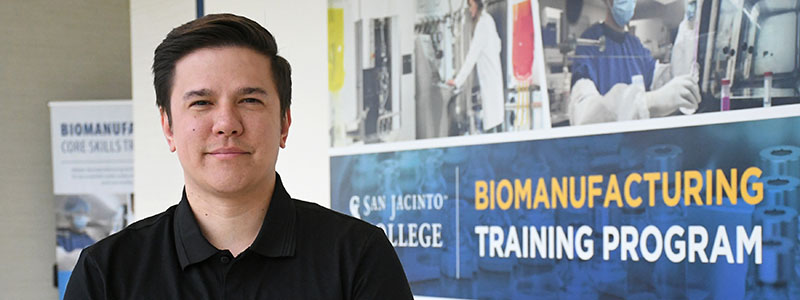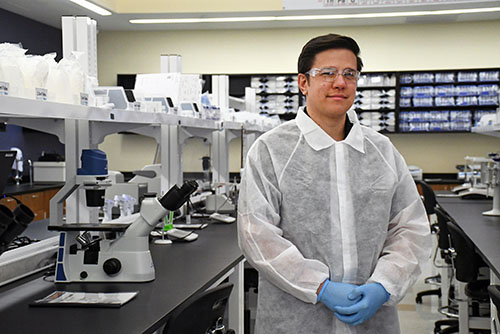From yawning in biology to launching new biotech program

STEM was the last box Kevin Rodriguez would have checked on a career assessment. Science seemed linked to yawning.
In Rodriguez’s high school biology class, handouts replaced hands-on experiments. It wasn’t until five years after high school that Rodriguez changed his thinking.
The epiphany came from the unlikeliest place: a TV series. Stunning visual aids in “The Cosmos: A Spacetime Odyssey” captured his attention.
“You take a step back and realize there’s a lot more,” Rodriguez said. “I knew I wanted to go into science after that.”
Today, the San Jacinto College alumnus no longer thinks science is boring or meant for smarter people. In fact, he teaches in the College’s newest STEM program: biomanufacturing technology.
Taking one giant leap
While enrolling at San Jac might have seemed a small step for some, it was a giant leap for the 23-year-old Rodriguez in 2014.
The former straight-C student had to take remedial classes and learn how to study. In several classes, he scraped by without textbooks, unable to afford them. Juggling work, family, and full-time classes felt like an “uphill battle.”
The turning point came after Rodriguez won biology and chemistry department scholarships through the San Jacinto College Foundation. Tears welled up as he read the award email. No more holding back.
“You feel like you belong — you’re validated,” he said. “This is the moment where it’s up to you. No one cares where you came from, what grades you made in high school. What can you do now?”
This is the moment where it’s up to you. No one cares where you came from, what grades you made in high school. What can you do now?
Building research resume
After the scholarships came more opportunities. Rodriguez stumbled across a flyer for the CURE program, the University of Iowa Continuing Umbrella of Research Experiences.
In summer 2017, he numbered among San Jac’s first three students pursuing cancer research at CURE.
“That was the first time I held a pipet and did my own experiments,” he said. "It was like being without training wheels. I learned about cell culture and all the reading that research takes.”
Rodriguez then leveraged his research experience and a conference presentation to land a Baylor College of Medicine internship, where he did neuroblastoma research for two summers.
Returning to San Jac

In 2023, Dr. Christopher Wild, San Jac’s associate vice chancellor of biotechnology,
approached the alumnus about an advisory committee for the new biomanufacturing technology
program. He also needed instructors.
The timing was perfect. Not only had Rodriguez always wanted to teach at San Jac, but his company was being bought out.
“I have a love for this College,” he said. “It changed my life.”
In January 2024, Rodriguez joined San Jac. The biomanufacturing technology program offers onboarding training and, beginning this fall, an Associate of Applied Science degree at the South Campus. In 2025, the Center for Biotechnology will open at the Generation Park Campus.
The program trains those who want to help patients behind the scenes — no needles or blood.
“There’s a gap between the Ph.D. scientist designing the drugs and the doctor administering the therapies,” Rodriguez said. “That’s where we come in, manufacturing those therapies and drugs.”
He compares biotechnology to process technology, involving fundamental science while still being “incredibly accessible.”
“You can troubleshoot problems, but you don’t need a Ph.D. level of understanding,” he said. “It sounds science-y, but it’s not as daunting as it might seem.”
No holding back
Gone are the days of yawning in high school biology. Now Rodriguez has single-minded focus: training others to produce life-saving therapies.
Ten years ago, San Jac helped him drop self-doubt and seize opportunities. Today, he’s helping others pursue brighter futures too.
“There’s no one checking your IQ at the door — no one asking for your family history,” he said. “The only thing holding you back is yourself.”
